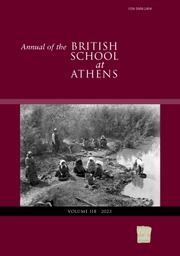Article contents
Hookers and lookers: prostitution and soliciting in late Archaic Thasos1
Published online by Cambridge University Press: 27 September 2013
Abstract
While accepting A. J. Graham's interpretation of the ‘stèle du port de Thasos’ (SEG 42. 785) as presenting regulations aimed at checking prostitution and associated soliciting in late Archaic Thasos, this article seeks to clarify some specific issues in the text. It urges (i) that the correct reading at l. 31 is κατοικιῶν, with the meaning ‘dwelling’; (ii) that θῆς ἓνεκεν (l. 32) should bear a passive sense, ‘for the sake of being seen’, and, likewise, θήσθω (l. 33), which necessarily picks up θῆς ἓνεκεν, should be regarded as conveying not only the idea of looking out but also of being seen by prospective clients; thus ll. 30–3 are to be rendered ‘no one shall go up onto the roof of maisons publiques in order to be seen, nor shall any woman either show herself from the windows’; and (iii) that προïστάσθω (l. 45) is not to be taken in conjunction with ἐσβαλλέτω (ll. 44–5) as governing the object κόπρον, nor as intransitive in the sense ‘solicit as a prostitute’, but rather as transitive middle, with the subject ὁ ἐνοικέων (l. 34), in the sense ‘exhibit women for sale’.
- Type
- Articles
- Information
- Copyright
- Copyright © The Council, British School at Athens 2002
References
2 Duchêne, Hervé, La Stèle du port Fouilles du port I Recherches sur une nouvelle inscription Thasienne (Études Thasiennes, xiv; École française d'Athènes, 1992Google Scholar). Hereinafter Duchêne.
3 See the review by Lewis, David in CR 43 (1993), 402–3Google Scholar, and the notice by Ph. Gauthier in Bulletin épigraphique, 1993, no. 395 ( = REG 106, 525–6). Hereinafter Lewis and Gauthier respectively.
4 ‘The Woman at the Window: observations on the “Stele from the Harbour” of Thasos’, JHS 118 (1998), 22–40CrossRefGoogle Scholar. Hereinafter Graham.
5 I quote from SEG 42.785.
6 Graham (23), in quoting this translation, has allowed the word ‘non’ to slip out, thus conveying a rather different meaning in the French.
7 ‘Une lecture est a exclure: καπηλείων κατοικιῶν s'accorde mieux aux vestiges’ (28).
8 Cf. Jeffery, L. H., The Local Scripts of Archaic Greece, rev. edn. with supplement by Johnston, A. W. (Oxford, 1990), 289–90Google Scholar.
9 There seems no reason to underdot the iota.
10 Gauthier's appeal to Cohen's, Getzel ‘ΚΑΤΟΙΚΟΙ, ΚΑΤΟΙΚΟΙ and Macedonians in Asia Minor’, Anc. Stud. 22 (1991), 41–50Google Scholar, is not particularly apposite for our purposes.
11 The passage cited by Graham (33 n. 71; cf. 30 n. 58) from Polybius xii.13. 2: τῶν ἀπὀ τἐγους ἀπὸ τοῦ οώματος εἰργασμἐνων οὐδείς, ‘none of those from a brothel who make a living from their body’, has only a superficial resemblance to our clause and is curiously unhelpful for Graham's own case: in the first place it is quite different from the passage before us here, in that there is no noun in front of τῶν on which τῶν might depend—the phrase must go with οὐδείς; and secondly, ironically enough, the singular σώματος provides a nice parallel to the singular use of τεγεος to which Graham objects (see below).
12 For the topographical information to be gleaned from the ‘stèle du port’ of Thasos, see Graham's most recent piece, ‘Thasos: the topography of the ancient City’ BSA 95 (2000), 301–27Google Scholar.
13 So Graham (32), although he feels that ‘that provision does not specify the sex of the people who went onto the roof for looking’.
14 Each maison has one roof but more than one window.
15 As Lewis points out (403), ‘There had been no example of συμπόσιον (43) as a building before the third century’.
16 ‘il faut exclure une construction intransitive’ (57), ‘et par consequent le sens de “se prostituer”’ (ibid. n. 90).
17 Gauthier (526) places a point of interrogation against the translation ‘entassera’.
18 Such a use of the present and aorist tenses is common in the other meanings of the verb: see LSJ 9.
- 1
- Cited by




